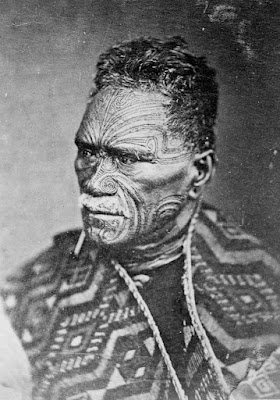Did you know you can see shit political economy from space? Here below is the Black Hole of North Korea at night, too poor to have enough lights to switch on.
And you can see shit political economy in Auckland too, in aerial photographs. To be accurate: you can see shit political economy in the form of the effect of tariffs. ...
Let me explain.
The first houses built here en masse were workers' cottages and then villas. When you fly over the city, you can see a ring of these villas around the inner parts of the city — especially so in Ponsonby and Grey Lynn — built right up until the First World War.
But after that war, something changed. It seemed to some that the United States had rescued Europe from its Great War, and had a lifestyle to which an increasingly prosperous population could aspire. It was the Jazz Age — the age of radio, electrification, automobiles, and the mass production (Fordism!) that made them affordable. In love with Americanism, in housing here it became the decade of the California Bungalow.
A villa is not a bungalow. Like the California lifestyle it aped (and which the world would fully fall in love with after another war), the California Bungalow was freer than the more uptight Victorian villa, and reached out for sun and air. Their broad spreading gables form a second ring around the city in what we now call the "tram suburbs," a ring from Pt Chev through Mt Albert, Sandringham, Mt Eden, Greenlane, Ellerslie, and right around to the border of Meadowbank/Remuera.
Their popularity was immense.
Their takeover seemed unstoppable.
Until something happened.
That something involved a tariff. Brought in by US Senators Smoot and Hawley, their Smoot Hawley Tariff Act raised tariffs on imports by an average of twenty percent. Their intention (we're told) was to quarantine American manufacturers from the effects of the 1929 stock market crash. What it did do instead was to spread the misery and contagion around the globe, kicking off the Great Depression and all but shutting down international trade for nearly two decades.
 |
| John Bell Condliffe's "wagon wheel" showing the dramatic death spiral of world trade following the disastrous implementation of the 1930 Smoot-Hawley Tariff Act |
New Zealand economist J.B. Condliffe has a world-famous diagram describing the accelerating downward spiral of trade as every country and trading bloc in the world put up their own tariff walls in response. It was one of the most successful acts of intentional self-destruction in all modern history.*
Almost at a stroke, we fell out of love with the US. In Britain, still the head of something called an Empire, an Imperial Preferences Act was swiftly passed making trade within the Empire roughly tariff-free — allowing many Commonwealth countries to escape the Depression first. (Not so the US of A, which had to wait until the death of a President and the end of a war to boom again.)
And trade amongst the Empire, rather than outside it, meant many more British goods replacing the previous love affair with American. Not least in housing. If the twenties was the decade of the California Bungalow, then the thirties was the decade of the English Cottage/English Revival. We can see these crabby, restrained offerings around the outer parts of the tram suburbs. (And you can see all these styles described in the Auckland Council's 'Style Guide,' pp 14-24)
In insulating itself from the world, America had not only shot itself in the foot economically, it also lost its influence with the rest of the world.
Turned out it was a not-so-great way to Make America Go Away Again.
* * * *
* Until April 2, 2025, that is, with what Johan Norberg calls "the longest suicide note in economic history."
"Thomas Rustici identified the role of the Smoot-Hawley Tariff Act in exacerbating the Great Depression, particularly through its effects on trade, banking failures, and economic contraction. His seminal work, *Smoot-Hawley and the Great Depression: A General Equilibrium Analysis* (2005), presents a compelling argument that Smoot-Hawley initiated a trade war, triggered mass bankruptcies, destabilized the banking system, and led to deflation and depression. ...
"Conclusion Rustici’s work provides one of the most comprehensive and rigorous explanations of how the Smoot-Hawley Tariff Act triggered a trade war, bankrupted farmers and businesses, destabilized the banking system, and created deflationary collapse. His analysis is central to understanding how protectionist policies can create economic catastrophe by disrupting credit, trade, and monetary liquidity. His insights remain critical in debates over trade policy and economic crises."












